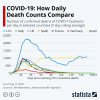- Joined
- 8 June 2008
- Posts
- 13,318
- Reactions
- 19,688
If you own a tonne of gold, can i be your friend?Disclaimer: I hold a tonne of gold and silver but do not hold any cryptocurrencies at all at the moment.
If you own a tonne of gold, can i be your friend?Disclaimer: I hold a tonne of gold and silver but do not hold any cryptocurrencies at all at the moment.
Medical science is seeking a remedy to a global pandemic. Your bias is irrelevant to which nations, if any, are successful in producing a vaccine.It is not my personal view, you are correct on that matter, it is the views of our communities that matter.
I stated a fact about vaccinations. If that is what is decided by any government as an essential element of receiving a service then it will carry the force of law.Last I checked, we live in a democratic society, people have choices. And where does it stop, cannot catch a train without showing you have been vaccinated? Cannot shop at the supermarket?
Errr... there was a liberal dose of hyperbole thereIf you own a tonne of gold, can i be your friend?
Nice findTankers loaded with Australian LNG have been put into go slow mode.
https://www.watoday.com.au/business...-as-buyers-delay-cargoes-20200716-p55cou.html
This morning, I was having a chat to a local coffee shop owner, and asked how things were going, he replied that he and the other coffee shops were having the best year yet so keep the borders shut.
He said this time of year most of the locals either go overseas or over East, so it is unusually busy, with most people home.
This is a W.A perspective, not sure the same applies elsewhere.
You definitely wouldn't get the same sentiment from coffee shop owners here in Melbourne!
This morning, I was having a chat to a local coffee shop owner, and asked how things were going, he replied that he and the other coffee shops were having the best year yet so keep the borders shut.
He said this time of year most of the locals either go overseas or over East, so it is unusually busy, with most people home.
This is a W.A perspective, not sure the same applies elsewhere.
Be careful Mr LeDuc, you will soon realised that even hinting at stats or figures , you know, facts... categorises you as a far right male chauvinist white suprematist.Probably worth a read:
https://stream.org/why-you-shouldnt...x51hS16ZGpyaK8EB2s3EyShyeU7CfqvH3XwqZFA6Rgb-U
jog on
duc
I doubt it!Probably worth a read:
https://stream.org/why-you-shouldnt...x51hS16ZGpyaK8EB2s3EyShyeU7CfqvH3XwqZFA6Rgb-U
jog on
duc


Thanks @SirRumpole.OK, I'll bite.
1. Germany, Italy , France , UK
2. Can't say, their cases are still rising, you would need to see a consistent reduction first.
Tend to agree with that.Thanks @SirRumpole.
Some things are rather obvious: neither the USA nor Brazil appear candidates for an open economy using "deaths" as the criterion.
However, the third question is, imho, the key. I regard the trend in "positive cases" as more important. My view is that unless you can keep the lid on positive numbers, then community confidence becomes a natural suppressor of economic activity. I hold that view for Australia, but not for the USA and a few other countries where "fake news" is de rigueur.
We have data supporting this, things like shopping centres etc were/are still wastelands even after the U.S reopened. Businesses have told people to continue working from home even when the office has been allowed to reopen. People are voluntarily/deliberately doing anything by distance which can be. They are only doing something face to face if they have no other choice.My view is that unless you can keep the lid on positive numbers, then community confidence becomes a natural suppressor of economic activity. I hold that view for Australia, but not for the USA and a few other countries where "fake news" is de rigueur.
Hello and welcome to Aussie Stock Forums!
To gain full access you must register. Registration is free and takes only a few seconds to complete.
Already a member? Log in here.